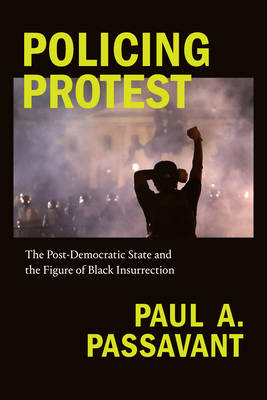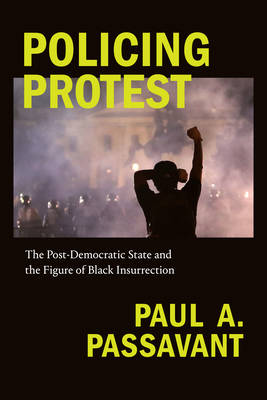
Door een staking bij bpost kan je online bestelling op dit moment iets langer onderweg zijn dan voorzien. Dringend iets nodig? Onze winkels ontvangen jou met open armen!
- Afhalen na 1 uur in een winkel met voorraad
- Gratis thuislevering in België vanaf € 30
- Ruim aanbod met 7 miljoen producten
Door een staking bij bpost kan je online bestelling op dit moment iets langer onderweg zijn dan voorzien. Dringend iets nodig? Onze winkels ontvangen jou met open armen!
- Afhalen na 1 uur in een winkel met voorraad
- Gratis thuislevering in België vanaf € 30
- Ruim aanbod met 7 miljoen producten
Zoeken
€ 48,45
+ 96 punten
Uitvoering
Omschrijving
In Policing Protest Paul A. Passavant explores how the policing of protest in the United States has become increasingly hostile since the late 1990s, moving away from strategies that protect protesters toward militaristic practices designed to suppress protests. He identifies reactions to three interrelated crises that converged to institutionalize this new mode of policing: the political mobilization of marginalized social groups in the Civil Rights era that led to a perceived crisis of democracy, the urban fiscal crisis of the 1970s, and a crime crisis that was associated with protests and civil disobedience of the 1960s. As Passavant demonstrates, these reactions are all haunted by the figure of black insurrection, which continues to shape policing of protest and surveillance, notably in response to the Black Lives Matter movement. Ultimately, Passavant argues, this trend of violent policing strategies against protesters is evidence of the emergence of a post-democratic state in the United States.
Specificaties
Betrokkenen
- Auteur(s):
- Uitgeverij:
Inhoud
- Aantal bladzijden:
- 368
- Taal:
- Engels
- Reeks:
Eigenschappen
- Productcode (EAN):
- 9781478011439
- Verschijningsdatum:
- 13/08/2021
- Uitvoering:
- Paperback
- Formaat:
- Trade paperback (VS)
- Afmetingen:
- 152 mm x 229 mm
- Gewicht:
- 489 g

Alleen bij Standaard Boekhandel
+ 96 punten op je klantenkaart van Standaard Boekhandel
Beoordelingen
We publiceren alleen reviews die voldoen aan de voorwaarden voor reviews. Bekijk onze voorwaarden voor reviews.











